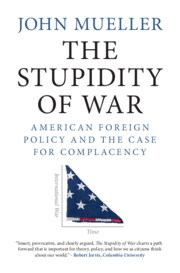Book contents
- The Stupidity of War
- The Stupidity of War
- Copyright page
- Dedication
- Contents
- Figures
- Acknowledgements
- Additional material
- Prologue The Rise of War Aversion and the Decline of International War
- Part I Assessing the Threat Record
- 1 Korea, Massive Extrapolation, Deterrence, and the Crisis Circus
- 2 Containment, Vietnam, and the Curious End of the Cold War
- 3 Military Intervention and the Continued Quest for Threat after the Cold War
- 4 Al-Qaeda and the 9/11 Wars in Afghanistan, Iraq, Pakistan
- 5 Chasing Terrorists Around the Globe and Other Post-9/11 Ventures
- Part II Evaluating Present Threats
- Afterword Aversion to International War as an Explanatory Variable
- Appendix: A Sardonic Litany
- Notes
- References
- Index
4 - Al-Qaeda and the 9/11 Wars in Afghanistan, Iraq, Pakistan
from Part I - Assessing the Threat Record
Published online by Cambridge University Press: 01 March 2021
- The Stupidity of War
- The Stupidity of War
- Copyright page
- Dedication
- Contents
- Figures
- Acknowledgements
- Additional material
- Prologue The Rise of War Aversion and the Decline of International War
- Part I Assessing the Threat Record
- 1 Korea, Massive Extrapolation, Deterrence, and the Crisis Circus
- 2 Containment, Vietnam, and the Curious End of the Cold War
- 3 Military Intervention and the Continued Quest for Threat after the Cold War
- 4 Al-Qaeda and the 9/11 Wars in Afghanistan, Iraq, Pakistan
- 5 Chasing Terrorists Around the Globe and Other Post-9/11 Ventures
- Part II Evaluating Present Threats
- Afterword Aversion to International War as an Explanatory Variable
- Appendix: A Sardonic Litany
- Notes
- References
- Index
Summary
American military policy during the current century has been an abject, and highly destructive, failure. Misguided and failed wars instituted in the aftermath of the spectacular terrorist attack of September 11, 2001, have cost trillions of dollars and killed well over 200.000 people, including more than twice as many Americans as perished on 9/11. Much-exaggerated alarm after 9/11 made politically possible an armed invasion of Afghanistan in 2001, spilling over into Pakistan, to depose an unpleasant regime that, despite some appearances, had essentially nothing to do with 9/11. And in 2003, the American military was sent to Iraq to remove the fully-containable and fully-deterrable regime of Saddam Hussein. Initially successful at first, the two ventures ultimately inspired lengthy insurgencies against the occupiers. In Iraq, Iran and Syria, concerned they might be next, worked successfully with friendly Iraqis to make the American tenure in Iraq as miserable as possible. Insofar as the invasions of Afghanistan and Iraq were motivated by a romantic notion that the forceful intervention would instil blissful democracy on grateful peoples, impelling other countries to follow suit and in time to love the United States and Israel, the ventures have been a fiasco of monumental proportions.
- Type
- Chapter
- Information
- The Stupidity of WarAmerican Foreign Policy and the Case for Complacency, pp. 89 - 120Publisher: Cambridge University PressPrint publication year: 2021



